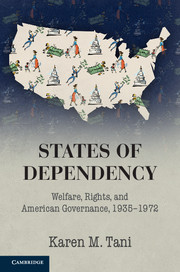Book contents
- Frontmatter
- Dedication
- Contents
- List of figures and tables
- List of gallery images
- Acknowledgments
- Introduction
- PART I 1935 TO 1949
- PART II 1950 TO 1972
- 5 States’ Rights against Federal Administrative Enforcement: Contesting Dependency
- 6 Rights against the State(s): Questioning Rehabilitation, Resisting Restriction
- 7 Welfare Rights outside the Courts: The Administrative Origins of Poverty Law
- 8 Subjects of the Constitution, Slaves to Statutes: The Judicial Articulation of Welfare Rights
- Conclusion
- Notes
- Selected Bibliography of Primary Sources
- Index
- Plate section
7 - Welfare Rights outside the Courts: The Administrative Origins of Poverty Law
from PART II - 1950 TO 1972
Published online by Cambridge University Press: 05 April 2016
- Frontmatter
- Dedication
- Contents
- List of figures and tables
- List of gallery images
- Acknowledgments
- Introduction
- PART I 1935 TO 1949
- PART II 1950 TO 1972
- 5 States’ Rights against Federal Administrative Enforcement: Contesting Dependency
- 6 Rights against the State(s): Questioning Rehabilitation, Resisting Restriction
- 7 Welfare Rights outside the Courts: The Administrative Origins of Poverty Law
- 8 Subjects of the Constitution, Slaves to Statutes: The Judicial Articulation of Welfare Rights
- Conclusion
- Notes
- Selected Bibliography of Primary Sources
- Index
- Plate section
Summary
In the summer of 1960, as the country prepared for a landmark presidential election, the federal agency's proverbial chickens came home to roost. Using Mississippi's federally approved “suitable home” law as a template, Louisiana amended its Aid to Dependent Children law to prohibit payments to any woman who had a child out of wedlock after receiving a check from the welfare department, unless and until she presented proof that she had “ceased illicit relationships” and was “maintaining a suitable home for the child.” A law enacted in the same legislative session denied welfare benefits to an illegitimate child if the mother of that child had two or more older illegitimate children. State attorney general Jack Gremillion sharpened the laws by giving them retroactive effect. The result, as intended, was a purging of the state's ADC rolls: 22,500 children lost their benefits. The vast majority (an estimated 98 percent) were African American. This, too, was intentional: historians now recognize these laws as part of a “segregation package,” designed to countermand federal integration orders, retaliate against African Americans for their civil rights demands, and undermine state politicians who had blunted or deflected segregationist demands.
As poor mothers struggled to provide for their families, local churches, community groups, and civil rights organizations mobilized. Taking the lead, the Greater New Orleans branch of the National Urban League (NUL) pressured state officials to repeal the law, raised and distributed funds, called on the Department of Health, Education, and Welfare to intervene, and assembled a network of supporters. The campaign even developed an international component: Operation Feed the Babies attracted national headlines when a group of concerned British women airlifted supplies into New Orleans. The next step, activists warned, was an appeal to the United Nations International Children's Emergency Fund, America's reputation be damned.
The incident produced memorable reactions. Newly elected governor Jimmie Davis, whose victory at the polls owed something to his popular “hillbilly” music and much to his segregationist campaign promises, labeled the affected mothers a “bunch of prostitutes” who ran “baby factories for money.” He dismissed reports of starvation as the handiwork of the opportunistic, New York–based civil rights organizations “poised like carrion crows” over the state. Editorials in major newspapers condemned Louisiana. The New York Times called its approach “mean” and “uncivilized”; the Chicago Defender described the abrupt terminations as “not only unjust, but criminal.”
- Type
- Chapter
- Information
- States of DependencyWelfare, Rights, and American Governance, 1935–1972, pp. 212 - 244Publisher: Cambridge University PressPrint publication year: 2016



